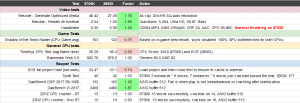Paul T McGraw
Senior Member
I am in the process of building a new PC for music. I am considering the new I9 9900k or perhaps the AMD Threadripper 2950? The biggest question in my mind is RAM. I think 64gb is more than enough RAM right now. But will it be enough in 3 or 4 years? I would like this system to last 5 to 8 years, so I like the idea of being able to increase RAM to 128gb if I ever need it.
Also, the Threadripper 2950 has more cores and threads 16 and 32 respectively. Will that be a big help when using a DAW? I don't know.
So, what to do, Intel or AMD?
Also, the Threadripper 2950 has more cores and threads 16 and 32 respectively. Will that be a big help when using a DAW? I don't know.
So, what to do, Intel or AMD?






